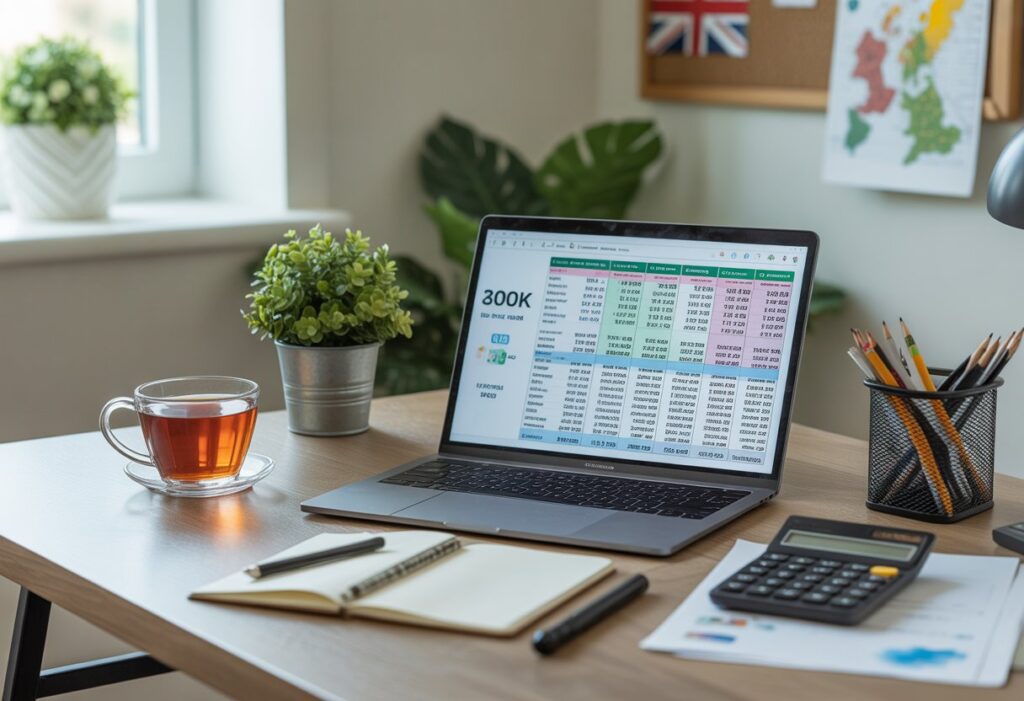Zero-based budgeting is a method that helps people plan their money carefully by assigning every pound a specific job. It means starting from zero and justifying every expense to make sure no money is wasted. This approach can work well for anyone in the UK looking to take control of their finances.

Unlike traditional budgets that use past spending as a guide, zero-based budgeting makes people rethink where their money goes each month. It can help spot unnecessary costs and focus on goals like saving or paying off debt.
This guide will explain how to create a zero-based budget tailored to UK expenses and income. It offers practical steps to get started straight away, making budgeting more effective and clear.
What Is Zero-Based Budgeting?

Zero-Based Budgeting (ZBB) lets people look at every pound they spend each month. It means starting from scratch and deciding where money is most needed. This approach focuses on expenses, income, and priorities, rather than just following last month’s plan.
Core Principles Of Zero-Based Budgeting
ZBB begins by assuming the budget is zero. Every expense must be justified from the ground up, every time a budget is made. It means no old expenses get automatically carried over without review.
The main idea is to link income and expenditure directly. Each pound is assigned a clear purpose, such as bills, groceries, or savings. The approach helps spot unnecessary spending and encourages active money management.
By regularly reviewing costs, ZBB helps households track where money goes. It avoids overspending and reduces waste. Everyone in the household can take part in deciding what costs to keep or cut.
Differences From Traditional Budgeting
Traditional budgets usually adjust last month’s numbers up or down. They often carry forward regular costs without question. This can lead to spending that’s automatic, not planned.
In contrast, Zero-Based Budgeting requires detailed explanation for every expense. It forces a fresh look at each category every cycle. With ZBB, nothing is assumed necessary; all items need clear approval.
Many traditional budgets rely on averages or estimates. ZBB works with exact amounts based on real priorities. This makes it more precise and responsive to changes, especially after unexpected events or income changes.
Why Zero-Based Budgeting Appeals To UK Households
UK households often face rising costs like bills, food, and travel. ZBB’s focus on justifying each expense helps people control these pressures. This method works well in times of financial uncertainty.
The approach fits well with UK culture of careful spending and planning. It encourages budgeting with clear goals such as paying down debts or saving for holidays.
ZBB also supports better money habits across the family. By involving everyone in budgeting, it builds awareness and control over money. Households can respond more quickly to changes in income or costs.
How To Start Zero-Based Budgeting In The UK

Zero-based budgeting works by assigning every pound earned to a specific purpose, leaving no money unallocated. The process involves accurately knowing monthly income, classifying all expenses, and making sure each pound has a defined role.
Setting Your Monthly Income Baseline
The first step is to calculate total monthly income. This should include salary after tax, benefits, pensions, and any side earnings.
It’s important to work with net income, the actual amount that reaches the bank account. This figure forms the base for the whole budget.
If the income changes monthly, like with freelance work, use an average from the last three to six months. This ensures the budget reflects a realistic figure to plan around.
Identifying And Categorising Expenses
Next, list all monthly expenses, including fixed and variable costs. Fixed costs are things like rent, council tax, and bills which generally stay the same each month.
Variable costs include groceries, transport fares, and discretionary spending, such as entertainment or eating out. It’s crucial to track all expenses for a full picture.
Organise expenses into categories:
- Housing (rent, mortgage, utilities)
- Food (groceries, occasional dining)
- Transport (public transport, fuel)
- Insurance (car, home, health)
- Savings and debt payments
- Personal spending (clothes, hobbies)
This creates a clear overview of where money goes each month.
Assigning Every Pound A Purpose
With income and expenses listed, assign money to each category until the total matches monthly income. The goal is full allocation, so every pound has a job.
Start by covering essentials first, like housing and food. Then allocate money for savings and debt repayments.
Distribute any remaining funds to non-essentials or increase savings. If expenses exceed income, adjust variable items or find ways to reduce fixed costs.
Tracking this on paper, spreadsheet, or budgeting app helps ensure the budget stays balanced every month.
Practical Tips For UK Residents

Zero-based budgeting works well when tailored to local income patterns, banking options, and living costs. Adjusting to irregular earnings, using the right tools, and managing price changes in the UK will help keep budgets accurate and realistic.
Adapting Zero-Based Budgeting To Irregular Incomes
Many people in the UK have incomes that change each month, like freelancers, contractors, or commission workers. They should start by figuring out a safe minimum monthly income based on past earnings. This figure forms a reliable base for the budget.
Next, they can allocate fixed expenses like rent, bills, and savings from that base. Any extra money earned in better months can be used for variable expenses or saving for future dry spells.
It helps to track income monthly and adjust the budget regularly. Setting aside a buffer fund is key. This helps cover months when earnings are low without needing to borrow.
Using UK Banking And Budgeting Tools
UK residents can use budgeting apps connected to local banks like Monzo, Starling, or NatWest. These apps can categorise spending automatically and give real-time updates.
Many apps offer features such as goal tracking, bill reminders, and alerts for overspending. Using apps designed for the UK ensures currency and taxes are handled correctly.
For those who prefer manual methods, free spreadsheet templates based on zero-based budgeting can be customised for pounds and pence. HMRC’s website also offers guidance on tax deductions which can be included in the budget.
Managing Fluctuating Living Costs
Living costs in the UK can vary due to weather, energy prices, and seasonal needs. Energy bills often rise in winter, so budgeting a higher average cost helps avoid surprises.
Grocery prices can change, so regularly reviewing spend and switching shops or brands can save money. Using loyalty schemes from Tesco, Sainsbury’s, or Lidl also cuts costs.
Transport expenses vary with fuel prices or travel cards. Including a buffer for price hikes or unexpected travel keeps the budget stable. Checking utility suppliers yearly can find cheaper deals, reducing overall bills.
Common Challenges And How To Overcome Them

Many people find sticking to a zero-based budget difficult because it requires regular tracking and adapting to surprise costs. Staying organised and flexible can help manage these challenges effectively.
Staying Consistent With Tracking
Tracking every expense is vital for zero-based budgeting to work. However, some may forget to record small purchases or ignore receipts. This can cause the budget to be inaccurate.
To stay on track, it helps to use budgeting apps that sync with bank accounts. Setting daily reminders to enter expenses reduces the chance of missing anything.
Another method is to keep a designated wallet or envelope for receipts. At the end of each day, reviewing and recording all spending ensures nothing is overlooked.
Creating a simple table to track income and spend can also boost accountability:
| Date | Item | Amount (£) |
|---|---|---|
| 19 May 2025 | Coffee | 2.50 |
| 19 May 2025 | Bus ticket | 1.75 |
Adjusting For Unexpected Expenses
Unexpected costs like repairs or medical bills can disrupt a zero-based budget quickly. It is crucial to include a buffer for such events every month.
Setting aside a small amount, for example, £20 to £30 as an emergency fund will help cover these surprises without stress. If nothing unexpected happens, this money can roll over or boost savings.
When a sudden expense occurs, the budget should be adjusted by reducing non-essential spending temporarily. This keeps the overall plan balanced without overspending.
Clear records of these adjustments ensure the budget stays realistic and workable.
Maximising Financial Benefits With Zero-Based Budgeting
Zero-based budgeting helps control spending by assigning every pound a specific purpose. It also focuses on meeting personal finances goals and managing money in a clear way.
Improving Savings And Debt Repayment
Zero-based budgeting forces a clear look at all income and outgoings. This method shows exactly how much money is left to save or repay debt each month.
By listing debts and savings goals, people can prioritise payments. For example, extra money can target high-interest credit cards or build an emergency fund. This reduces interest costs and improves financial security.
Regularly reviewing the budget means adjustments can be made. If unexpected expenses arise, saving targets can be tweaked without losing control of debt repayments.
Supporting Financial Goals In The UK Context
Zero-based budgeting suits UK-specific goals like saving for a house deposit or pension contributions. It makes planning for these easier by allocating pounds purposefully every month.
It also helps plan for UK taxes and changes in benefits, ensuring money is available for payments like council tax and National Insurance.
Using a zero-based system means no money is wasted. Every pound has a role linked to specific UK financial priorities, making goals more realistic and manageable.

